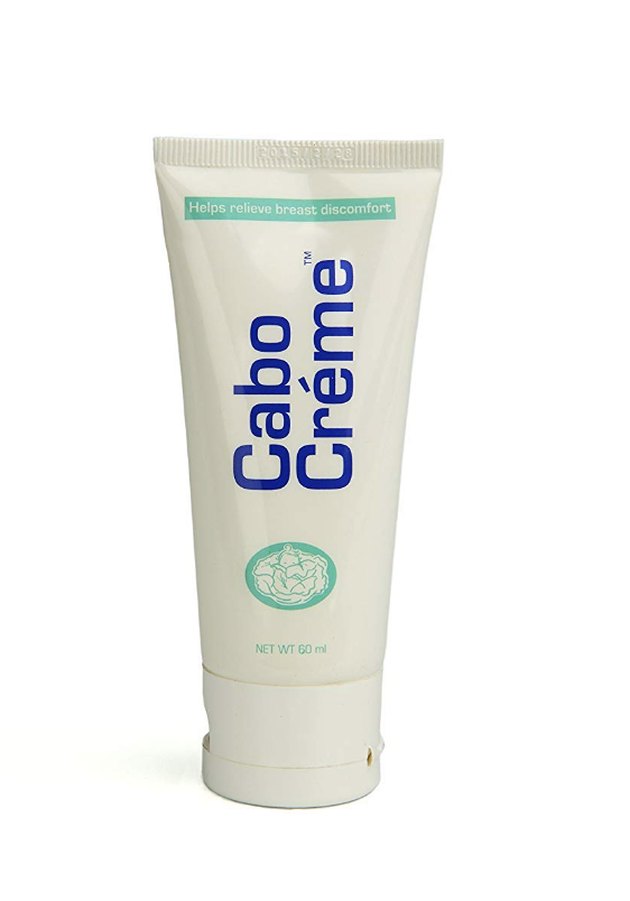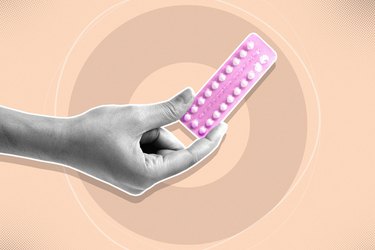
From sore nipples to achy upper-body muscles, low libido and intense hunger, your body goes through many changes while breast or chestfeeding.
And just as your body underwent major changes to produce milk, it must also shift gears when your lactation journey comes to an end. It's true: The weaning process can cause its own set of (sometimes unexpected) physical and emotional symptoms.
Video of the Day
But being well-informed can help normalize your experience and help you navigate the transition with greater ease.
That's why we enlisted experts to share what really happens to your body when you stop breastfeeding, along with ways to manage some of the more surprising side effects of weaning.
1. You Might Experience Mood Changes
Feeling a little down while weaning? You're not imagining it.
"Just like when you're pregnant or lactating, weaning can lead to fluctuations in your hormone levels" that may affect your mood, says Cindy Rubin, MD, IBCLC, pediatrician and breastfeeding medicine specialist at In Touch Pediatrics and Lactation.
There are two hormones responsible for this shift — oxytocin and prolactin, says Melissa Kotlen, IBCLC, RN, an international board-certified lactation consultant, registered nurse and care manager at Boram Care, a postnatal care center.
These are considered "mothering hormones" because they contribute to a sense of love, calm, contentment and attachment, she says.
When you're breastfeeding, your body produces high levels of oxytocin and prolactin, but while you're weaning, those levels dip. That means many of those amazing feelings may dissipate, too, Kotlen says. It's not uncommon to feel tearful, sad, moody or irritable as a result.
Plus, even if you've chosen to wean, you may still feel grief or sadness that your breastfeeding journey has come to an end, Dr. Rubin says.
Tip
The choice to stop breast or chestfeeding is a deeply personal one. So if you’re not totally sure you’re ready to wean, hold off, Kotlen says. First, take some time to process your reasons. Once you’ve explored your feelings, you can decide whether weaning now or later is the best option for you.
What You Can Do
Being educated about the weaning process is a great place to start, Dr. Rubin says. Knowing that these mood changes may happen — and that they’re temporary (hormonal shifts tend to settle within days to a few weeks) — can help you through the experience.
Likewise, connecting with other people who are also weaning (via support groups or social media, for example) may help you feel less alone and more supported during this time of transition, Dr. Rubin says.
That said, if these mood changes are persistent and severe, you might be experiencing a more serious mental health issue. Talk to your doctor or a mental health professional, who can provide additional resources and support.
“Postpartum Support International is also a great resource if you're going through any postpartum mood or anxiety disorders, whether or not they are related to lactation or weaning,” Dr. Rubin adds.
2. Your Period May Be Different
Even if your period was fairly regular pre-pregnancy, your monthly cycle may be a little inconsistent while you wean.
"Once again, we've got some hormones at play," Kotlen says. "This time it's estrogen and prolactin."
"During lactation, your estrogen levels are very low and your prolactin levels are very high, both aiding in suppression of your period," she says. "When you wean, though, you're teaching your body that it's OK for those hormones to return to 'normal' levels."
This transition is not always fast or predictable, though. Dr. Rubin says it's "similar to when menstruation begins during puberty — i.e., the first few periods may be 'anovulatory,'" she says. This means that you menstruate without ovulating.
"Anovulatory bleeding is often irregular," Dr. Rubin says. Your period may be heavier or lighter than usual or may last for a shorter or longer amount of time.
For some people, these post-breastfeeding anovulatory cycles can last for a while. But for others, they may start ovulating within their first period (or even while they're still lactating), Dr. Rubin adds.
The intensity of your period symptoms may also shift after weaning. For example, you may feel worse cramping, or you may even notice fewer symptoms of premenstrual syndrome (PMS), according to Penn Medicine.
What You Can Do
Patience is key, Dr. Rubin says. Your period should regulate within six months or so after weaning.
“If you continue to have unusual, irregular or very different bleeding patterns (compared to pre-pregnancy) after six months of weaning, you should call your doctor so they can rule out other causes,” she says.
And keep in mind: An irregular period does not protect you from getting pregnant, Kotlen adds. So if you don't want to get pregnant, make sure to use a form of birth control.
3. You Might Have Skin Issues
When you stop breastfeeding, you may notice some changes in your skin, often like you're going through puberty. Your fluctuating hormones can cause some acne, Dr. Rubin says.
"When you wean, the hormones responsible for maintaining milk supply — prolactin and oxytocin — drop, and your progesterone and estrogen begin to rise again," Kotlen says.
But this hormonal shift also causes "an increase in natural oils (sebum) that can clog pores and cause acne, making you feel as though you're reliving your teenage years," she says.
On a positive note, other pregnancy-related skin changes may actually improve after weaning. For example, your stretch marks may lighten, and your areolas and nipples (which may have darkened and/or grown larger) will usually return to their original appearance, Kotlen says.
What You Can Do
To manage acne while weaning, try the following tips, per Dr. Rubin and Kotlen:
- Wash your face with a gentle, hypoallergenic cleanser every day.
- Opt for hypoallergenic, fragrance-free makeup products.
- Drink plenty of water.
- Try over-the-counter treatments like benzoyl peroxide products or adapalene.
- Make an appointment with a dermatologist if you’re getting large pimples that leave scars.
4. You Might Feel Fatigued
Breastfeeding takes up a lot of energy, which can make you feel exhausted, Dr. Rubin says. In fact, your body burns anywhere from 500 to 700 extra calories per day while you're nursing, per La Leche League International.
But weaning can lead to fatigue, too.
As your progesterone and estrogen levels begin to normalize, you might feel very tired, Kotlen says. "Some people even say they feel dizzy," she adds.
Plus, you might also be adjusting to a new sleep schedule, Kotlen says. Your body may still wake you up at 3 a.m. for a middle-of-the-night feeding session even once you've stopped nursing.
What You Can Do
Staying hydrated, exercising regularly and trying to keep up with a consistent sleep routine (as much as possible with a baby or toddler) will help you feel less tired, Kotlen says.
Patience is also key. If your body is accustomed to waking in the middle of the night, it could take some time to adjust to new sleep habits.
If your fatigue and sleep problems worsen or come with feelings of sadness, or lost interest/enjoyment in your baby or your favorite activities, you could be dealing with postpartum depression, Dr. Rubin says. In that case, reach out to your doctor or a therapist, who can offer guidance and support.
5. You Might Continue to Produce Milk
When you stop breast or chestfeeding, you don't automatically stop making milk.
In fact, "milk production can continue for many months after weaning," Dr. Rubin says.
Think of it like this: "Your body had to learn to produce milk, and now it has to learn to let go of it," Kotlen says. "Every body is on its own timeline: Some start the weaning process and milk is dried up within days, while others are still hanging onto milk a year later," she adds.
People who produced an overabundance of breastmilk also tend to take a bit longer to dry up their supply, Kotlen says.
And "if you're frequently stimulating your nipples or hand expressing 'just to check' if you're still making milk, you will likely continue to make milk," Dr. Rubin adds.
That's because nipple stimulation and hand expression send signals to your body that it needs to continue to produce milk, she says.
What You Can Do
To help dry up your supply, stop stimulating your nipples and/or hand expressing. This will communicate to your body that it no longer needs to lactate.
In addition, Kotlen recommends using products like CaboCréme ($29.95, Amazon), a topical cream formulated with concentrated cabbage extract to support the suppression of breastmilk. “It is safe, effective and works wonders,” she says.
6. You Might Feel Like You Have the Flu
Feeling feverish while weaning? "Fluctuating hormones can sometimes cause chills and sweats," Dr. Rubin says. (It shouldn't cause a true fever, though.)
But "if you're feeling flu-like symptoms along with breast engorgement or have distinct areas of swelling or discomfort in your breasts, you may have mastitis," Dr. Rubin adds.
Mastitis is a "breast infection that can happen during or after weaning, as your body may hold onto milk and not release it (aka, milk stasis)," Kotlen says.
This stagnant milk inside your breast can quickly become an ideal environment for bacteria to breed, according to the Mayo Clinic.
Again, "symptoms include feeling like you have the flu (think: extreme tiredness, aches and chills) and running a high-grade fever (102 degrees Fahrenheit and above)," Kotlen says.
Breast redness, tenderness and lumpiness are all telltale signs of mastitis, too, she says. Your breasts may even feel warm to the touch.
What You Can Do
Chills and sweats without a fever or breast symptoms should resolve fairly quickly once your hormones have a chance to settle.
Mastitis won't resolve on its own, though, Kotlen says. You'll need a round of antibiotics to treat the infection.
While you can’t always avoid mastitis, you can lower your chances of getting it by weaning slowly.
"Weaning too quickly poses a greater risk for mastitis. But talking to a lactation consultant about your plan can help you immensely,” Kotlen says.
7. Your Breasts Might Hurt
Just as the risk for mastitis increases with weaning, so does painful engorgement and clogged milk ducts, Kotlen says.
Engorgement happens when milk isn't emptied from your breasts, and fluid and blood collect in your tissues, resulting in swelling, tightness and an increase in breast size, according to the Children's Hospital of Philadelphia.
Your breasts may feel hard, full, warm, tender to the touch and may even throb or ache with pain.
Clogged milk ducts can also happen if your breasts are full for long periods of time, Dr. Rubin says. Your ducts are not truly "clogged," but just get narrower due to inflammation, Kotlen adds.
Engorged breasts and clogged ducts are more common at the start of your lactating journey as your body adjusts to its new job of making milk. But these problems can return again when you're weaning.
That said, "some amount of engorgement is expected and is a necessary part of the weaning process," Dr. Rubin says.
In short, because you're no longer feeding your baby, milk stays in your breasts, which can be uncomfortable.
What You Can Do
Once again, patience is key with this symptom. Eventually, “your body will get the message that it should stop making milk,” Dr. Rubin says.
In the meantime, you can try these tips to reduce your chances of engorgement, clogged ducts and discomfort, per Dr. Rubin and Kotlen:
- Wean slowly: Drop one nursing or pumping session every few days. This will give your body a chance to adjust.
- Follow the Academy of Breastfeeding Medicine’s guidelines: If you develop a clogged duct or start to notice redness or soreness, use a combination of ice, breast rest (no aggressive massage) and an anti-inflammatory medicine like ibuprofen.
- Try natural remedies: Chewing on candies that have peppermint oil, or drinking peppermint or sage tea may help speed the weaning process. Both herbs are known to potentially decrease milk production, per the Drugs and Lactation Database. Likewise, sunflower lecithin (often taken in supplement form) can help decrease inflammation, per the Drugs and Lactation Database.
- Call your doctor: If you have a fever, chills or sweats along with a plugged duct or an area of redness/soreness/swelling in your breast, which doesn’t resolve with the above measures, you may have developed an infection like mastitis. See your doctor, who may need to prescribe you an antibiotic.
8. Your Libido May Rev Up
During breast or chestfeeding, some people feel a lull in libido.
That's because your estrogen levels are very low while lactating, which can contribute to vaginal dryness and decreased sexual desire, Kotlen says. Couple this with the exhaustion of taking care of your baby day and night, and sex often becomes low priority, she adds.
"The good news is that, after weaning, estrogen levels rise again, and libido will return," Kotlen says.
Of course, every person is unique. Some folks continue to have a high sex drive throughout their lactation journey while others still don't feel ready for intimacy after weaning. Both are totally natural.
What matters most is how you feel about your libido. As long as you're content, it's not important whether your sex drive is high or low.
What You Can Do
Speak openly about your low libido with your doctor and with any partners, so they can best help you. Have patience and know that a fluctuating libido is normal and common during this stage of life.
9. Your Appetite and Weight May Fluctuate
People who breast or chestfeed often feel very hungry. As mentioned, "our bodies require about 500 extra calories while we're lactating," Dr. Rubin says. That means you may need to eat a little more to maintain your milk supply.
But as you wean, your caloric needs will lessen. "This can lead to changes in appetite and fluctuations in weight," Dr. Rubin says.
For example, if you're still in the habit of eating an extra snack each day, you might put on a few pounds because your body no longer needs the additional calories.
What You Can Do
As you navigate post-chest or breastfeeding hormonal changes, try these tips to help you maintain a healthy weight for your body, per Hackensack Meridian Health:
- Try to avoid sugar cravings: Focus instead on eating plenty of healthy fats (think: extra-virgin olive oil, avocados and fatty fish) and lean proteins (think: chicken breast and legumes).
- Get as much sleep as possible: While sleep is often in short supply when caring for a baby or toddler, prioritizing rest is essential for healthy weight management. Case in point: Lack of sleep is linked to higher levels of the “hunger hormone” ghrelin, which increases appetite, and lower levels of the hormone leptin, which tells your body that it’s full, according to Harvard Health Publishing.
- Exercise regularly: Getting in a little movement every day can help regulate stress hormones, which may amp up your appetite.
The Bottom Line
The changes your body goes through while weaning can be unexpected and sometimes uncomfortable.
Knowing what to expect before you stop breastfeeding can help you prepare for the transition. Still, it's OK to need a little assistance along the way.
If you have any questions or concerns about your weaning process, talk to your ob-gyn, midwife or an international board-certified lactation consultant (IBCLC). IBCLCs are great resources throughout your breast or chestfeeding and weaning journey.
Where to Find Licensed Lactation Consultants
The following organizations can help you find IBCLCs in your area:
- La Leche League International: “How can I lose weight safely while breastfeeding?”
- Mayo Clinic: “Mastitis”
- Children’s Hospital of Philadelphia: “Breast Engorgement”
- Hackensack Meridian Health: “What Happens to Your Hormones After Birth?”
- Harvard Health Publishing: “Snooze more, eat less? Sleep deprivation may hamper weight control”
- Penn Medicine Lancaster General Health: “4 Things That Might Surprise You About Weaning”
- Tiktok.com: "Melissa Kotlen, IBCLC, RN"
- Drugs and Lactation Database: "Peppermint"
- Drugs and Lactation Database: "Lecithin"
Is this an emergency? If you are experiencing serious medical symptoms, please see the National Library of Medicine’s list of signs you need emergency medical attention or call 911.




